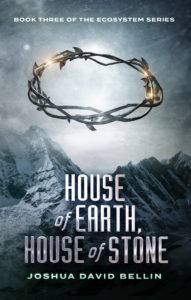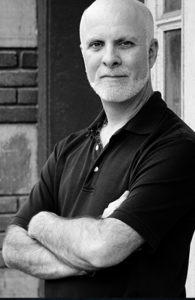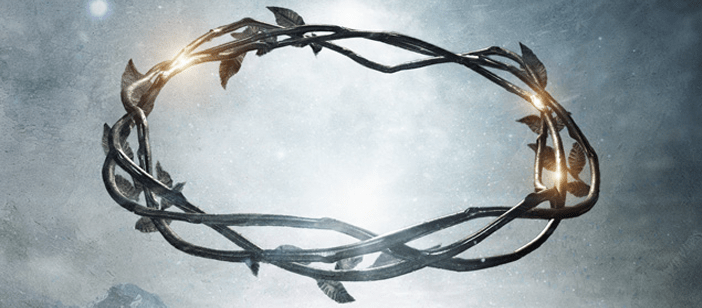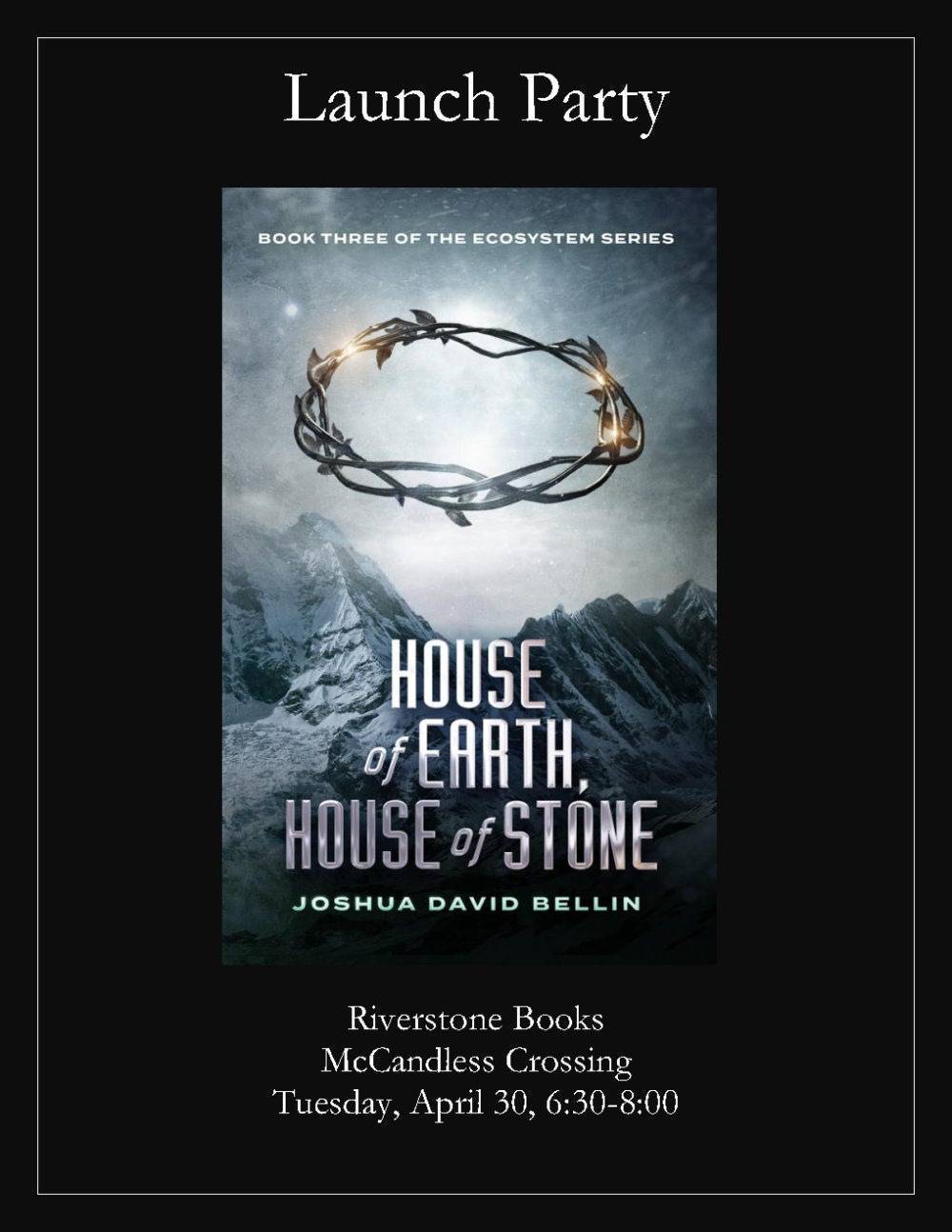From the Publisher: The Ecosystem is at war
The dark queen Miriam has attacked the City of the Queens. Commanding an army of creatures from legend and nightmare, she appears unstoppable. Sarah is forced to flee into the treacherous mountains north of the city, where she seeks to discover word of the missing queen, Celestina. Only with their combined strength, Sarah believes, is there any hope of contesting the dark queen’s might.
But to wage the final battle against the dark queen, Sarah will have to overcome an ancient curse that threatens not only the survival of the city but the existence of the Ecosystem itself. And she will have to decide whether to save Isaac, the boy she loves, at the cost of losing everything else she holds dear.
House of Earth, House of Stone is a riveting fantasy-adventure set in a world where Nature holds dominion over humankind. The final book in the Ecosystem trilogy, it completes the journey Sarah began in Ecosystem and The Devouring Land (start reading both right here on Littsburgh!).
Don’t miss out: Bellin will be launching House of Earth, House of Stone at Riverstone Books on April 30 (signed books of the entire trilogy will be available for sale)!
About the Author: Joshua David Bellin has been writing novels since he was eight years old (though the first few were admittedly very short). A college teacher by day, he has published numerous works of fantasy and science fiction, including the two-part Survival Colony series (Survival Colony 9 and Scavenger of Souls), the deep-space adventure Freefall, and the short story collection Ten Tales of Terror and Terra. The Ecosystem Trilogy — Ecosystem, The Devouring Land, and House of Earth, House of Stone — is his latest foray into speculative fiction. In his free time, Josh likes to read, watch movies, and take long nature hikes with his kids. Oh, yeah, and he likes monsters. Really scary monsters.
 Dominique stands in the brood chamber.
Dominique stands in the brood chamber.
She is a child of seven, and her world is falling apart—her mother and father and baby brother dead, the only home she’s ever known turned alien and hostile. She had a pet for a time, a cat named Leo, but just this month he tried to tear her throat out, and the women who watch over her hacked him to pieces before her eyes. When the bad things started, when she was five years old, the grown-ups walked the campus with rifles at their shoulders and handguns at their hips; from her bedroom high in the Cathedral, she heard the sound of gunfire echoing deep into the night. But she hasn’t heard that sound for months, and now the men and women carry whatever weapons they can lay their hands on: knives and sharpened stakes and the meat cleavers with which the women turned poor rabid Leo into a pile of blood and fur and purple guts. When they were done with him, they washed the bloody paw prints from her bedroom floor with mops and buckets of water.
 Dominique’s eyes scan the brood chamber, the golden waxy floor and walls with their six sides. She’s never been here before, though she’s known of it since she was a girl of three. Her parents told her about it, and about the creature that once dwelled here: the queen bee, the one who was going to save the world and make the flowers bloom again. The one who, they told her, carried a part of Dominique inside its body. That’s why they named it after her: Apis dominica, Dominique’s bee. She was fascinated by the idea of sharing a part of her body with a bee, but when her parents finally showed her pictures of it, she found herself repulsed by the creature, an enormous insect the size of her baby brother before he died. Before the birds with feathers the color of a robin’s red breast swooped down from the sky and snatched him from her mother’s arms—her father was dead by then—and carried him off into the trees. Her mother screamed and ran after them, then clutched Dominique’s face to her chest as the bloodbirds began to feed.
Dominique’s eyes scan the brood chamber, the golden waxy floor and walls with their six sides. She’s never been here before, though she’s known of it since she was a girl of three. Her parents told her about it, and about the creature that once dwelled here: the queen bee, the one who was going to save the world and make the flowers bloom again. The one who, they told her, carried a part of Dominique inside its body. That’s why they named it after her: Apis dominica, Dominique’s bee. She was fascinated by the idea of sharing a part of her body with a bee, but when her parents finally showed her pictures of it, she found herself repulsed by the creature, an enormous insect the size of her baby brother before he died. Before the birds with feathers the color of a robin’s red breast swooped down from the sky and snatched him from her mother’s arms—her father was dead by then—and carried him off into the trees. Her mother screamed and ran after them, then clutched Dominique’s face to her chest as the bloodbirds began to feed.
The brood chamber echoes her steps as she walks to the center, where the pictures she saw showed the queen wrapped in something like golden threads. Dominique shudders as she reaches down to touch the soft, gummy wax of the chamber’s floor.
“Mommy,” she says. “I wish you were here.”
There’s a book her mother used to read to her, a book about a girl her age who grew up close to the university. The girl’s name was Rachel, and she was a girl who loved and worried about the world, which in her own time—long before the rise of the Ecosystem—was becoming treacherous and wild. Rachel grew up to be a scientist like Dominique’s mother and father, but she sickened and died, just like Dominique’s father sickened and died when the queen bee stung him and Dominique’s mother sickened and died when the pretty pink flower in the garden bit her on the ankle. Ever since then, Dominique hasn’t wanted to look at that book, with its cover picture of a monarch butterfly hovering over Rachel’s shoulder. She wonders whether that’s what happens to people who care for the world, that they sicken and die at the world’s touch. She tries not to think about what might become of her when she grows up, if she grows up at all. The thought scares her so.
But there’s one thing that scares Dominique more than anything else, and it’s why she’s come to this room today. It’s something her mother said as she lay dying in her bedroom in the Cathedral, her skin drained of its beautiful brown color and her eyes cavernous as a skull’s. She told Dominique that she loved her, and that Dominique must be strong once she was gone. And then she told her that, because Dominique shared part of her body with the queen bee, she must visit this place, and learn if there was anything she could do to stop the Ecosystem now that the queen was dead. She must be prepared, her mother told her, to make a sacrifice—a big word for a hard choice—to save the world her mother and father and little brother had known and loved.
“Will you do that, Dominique?” her mother asked, her breath whistling through the empty space where her teeth had been.
“Yes, Mommy,” she answered, and held her mother’s hand while she died.
But she knows now that she didn’t mean it. She said it only because her mother was dying, and she was trying to be strong for her. Now that Dominique’s here, in this shiny, empty room that once housed a monster, she knows that the sacrifice is too great. Even to save the world, she knows it’s something she simply can’t do.
“I’m not ready,” she says to the silence of the brood chamber. “I’m not ready to be queen.”
My dreams have been like that lately.
For the past few days, at least. Since we returned from the site of my former village. Since I learned of the fate of Miriam, and of the war she plans to launch against us.
I’ve not slept much in that time. The queen before me, Celestina, told me that women of our bloodline don’t need to sleep at all, but in that, as in so much else, she was wrong. Queens can go without sleep for longer than most people, that’s true. But depriving ourselves of rest over lengthy periods of time weakens us, clouds our minds. Makes us less able to communicate with the Ecosystem. And now more than ever, I need the Ecosystem to listen to me, to talk to me. To tell me what to do.
I visit the brood chamber multiple times during the day, and sometimes at night. It’s there that my dreams of the little girl who would become the first queen of the city are strongest, and this convinces me that they’re more than dreams—that somehow, in this chamber, the blood I share with Queen Dominica connects me to her mind, her memories. Some of the things I see in my dreams—rifles and cell phones, fluffy cats without the red eyes and curved fangs of the fell-cats that inhabit my world—are totally foreign to me, yet when I see them through Dominique’s eyes, I know their names and purposes. When I lay my head on the floor where Dominique stood nearly two hundred years ago, I’m joined not just to the Ecosystem but to her, the seven-year-old girl who would overcome her reluctance and accept the sacrifice, the giving of herself in exchange for her people’s safety. I feel her fear, her resolve. When I wake and find the questions I want to ask ready-formed on my lips, I feel her so strongly in the room with me, I expect her to answer.
But she never does.
How did you do it? I ask of her. How were you brave enough? How did you know that your strength, your will, wouldn’t fail?
I rise from the floor after my dreams have dissipated, stretch out my arms so the Ecosystem can grasp the silver bracelets I wear at my wrists. I draw comfort from the wild, and I provide it with comfort in turn. I try to push my awareness past the black web that blocks all light, the tangled strands of power that hold the village in thrall and that will soon begin their march toward the City of the Queens. I never succeed. Something stands in my way—the dark queen, I tell myself. It could just as easily be me.
My own mother died years ago, when I was less than three. My father’s body lies beneath tons of soil in the dark queen’s lair. My best friend, my only friend, if she’s alive, is trapped within the strands of the queen’s web. And the dark queen herself—Miriam, the girl I treated so shamefully when she was mine to teach—is planning an assault on our city that will complete the work of destruction the Ecosystem began when Dominique was a child.
I need allies. I have none. So I call on another enemy who should have been a friend. Another friend whom my own faults turned into an enemy.
Excerpted from House of Earth, House of Stone by Joshua David Bellin. Copyright © 2019. All rights reserved. No part of this excerpt may be reproduced or reprinted without permission in writing from the publisher.


























